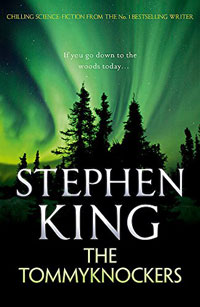(Nov 16 – Dec 20)

The Tommyknockers may be a much maligned book among King fans, but turns out to be a very significant book in the life of the man itself. On the surface, it’s a story about a group of people who get exposed to a toxic substance and start turning irretrievably into monsters. It’s also a story about a globally successful author whose addiction to booze and cocaine finally reaches crisis point.
There have been a number of King’s other novels that have reflected his addictions (Cujo, for one, springs to mind) but few as explicitly as this one. In this story, the inhabitants of the town of Haven know that they are losing their humanity, but are too hooked on the process to do anything to stop it. In several scenes it’s made pretty explicit that there are voices talking to them, telling them why to do, urging them to continue letting themselves get corrupted.
On the other side of the page, there’s reasonable speculation that this novel was King’s ‘cry for help’—a potentially final message that his addictions were consuming him and threatening to transform him into one of the monsters he typically writes about. The narrative goes that King’s wife staged an intervention, King finally went dry and it was a couple of years before he was able to get writing again.
Fittingly, for a novel that played so significantly into King’s future, The Tommyknockers is intriguing for how much it looks into the past. It is very clearly inspired (and ‘inspired’ might even be an overly generous term) by two classics of the sci-fi/horror genre: Invasion Of The Body Snatchers and Quatermass & The Pit (with various generic references to the works of Lovecraft also thrown in). Structurally it also harks back to King’s own earlier works. The overall concept of a town falling prey to a great evil brought back fond memories of Salem’s Lot, while the introduction to our main protagonist, Gard, would have slotted very nicely into the early chapters of The Stand. If nothing else, The Tommyknockers reads a lot like a man trying to escape his past by taking one step after another into an uncertain future; one where there’s no guarantee that the demons won’t eventually claim his soul too.
The Adaptations
There is one adaptation of The Tommyknockers; a 1993 TV miniseries which I have never watched. TV in the early 1990s was capable of producing good stuff, but was still mired in a world of budget constraints and broadcasting standards which meant adapting Stephen King novels, especially ones as visually demanding as The Tommyknockers, was a bit of a fool’s errand.
If they were to do an adaptation now, I think there’s fantastic scope for a “limited series”, as they call them now. However, I suspect the novel isn’t sufficiently well regarded to make it worthwhile.
The Reading
Unlike most of the other King novels I’ve previously read, I vividly remember my first reading of The Tommyknockers. It was while on a holiday in France, and my girlfriend of the time was (rightfully) put out that I was spending much of my time glued to the pages of this book. I literally couldn’t put it down; I had to keep reading to see what would happen next. It’s possibly the fusion of sci-fi and horror that so grabbed me back then, because the narrative isn’t really a classic page-turner.
I believe this is my third reading of the novel (when and where the second reading took place is a lost memory) and I really enjoyed it. There were bits I remembered vividly, and bits I had totally forgotten were in the book at all. There were also a number of references to It, and even a reappearance of the sinister government outfit The Shop, from Firestarter.
I can’t really get on board with the criticisms of this novel. Yes it’s bloated and indulgent, but so is It and various other King novels that get otherwise lauded. Yes, it’s derivative, but King wears his influences so openly that you have to be quite the curmudgeon not to take some delight in it. It’s true that the plot is a bit thin (it’s mostly about the gradual disintegration of the town of Haven, and the looming yet questionable potential for salvation of our main character), but King has frequently focused more on the way horrific events affect his characters than on building a solid plot structure around them.
In short, while not one of his best, The Tommyknockers is an archetypal Stephen King novel, and if you’re like me you may well have a lot of fun with it.
Up next: sometimes alter egos come back …
